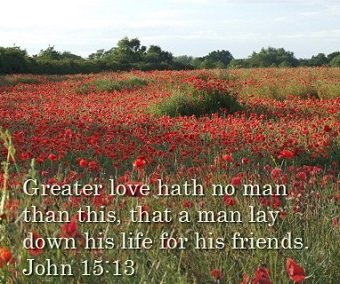EXPLORING THE WORD
The Greatest Love
What does it mean that the greatest love is to lay down one's life for one's friends?
Jesse McPhaill

To briefly roadmap the journey, I will begin by walking through a basic exegesis of the verse in question (John 15:13), and then go on to give detailed interpretative descriptions and implications. May it be a blessing!
~ The Lord Jesus Christ, John 15:13
"Greater love hath no man" — There is no possible way to express the highest degree of love a man is able to muster or possess, nor any other action which the greatest love can do in natural heartfelt response. Here is the example of the greatest love achievable.
"than this" — following is the example of the greatest love.
"that a man lay down his life for his friends" — to sacrifice one's very life in an action fueled by that love, and to do so for one's friends, however ungrateful, however undeserving. The friends are benefitted at the expense of the one who sacrificed his life.
That Christ here speaks of Himself is clear, but that He moreso is giving an exhortation to His beloved disciples is all the surer. Christ's love went further than this example, for while "greater love hath no man," Christ is not merely man, but is God in human flesh (John 1:1, 14). His love extends, not just to His "friends," but to the entire godless and unbelieving world (John 3:16; 12:32-33; I John 2:2), in accordance with the Apostle's saying, "For scarcely for a righteous man will one die: yet peradventure for a good man some would even dare to die. But God commendeth his love toward us, in that, while we were yet sinners, Christ died for us" (Romans 5:7-8).
This phrase which may be perplexing — "lay down" in respect to one's life — is used by Christ in another context, from which we can determine its more broad meaning.
I am the good shepherd: the good shepherd giveth his life for the sheep...I am the good shepherd, and know my sheep, and am known of mine. As the Father knoweth me, even so know I the Father: and I lay down my life for the sheep... Therefore doth my Father love me, because I lay down my life, that I might take it again. No man taketh it from me, but I lay it down of myself. I have power to lay it down, and I have power to take it again. This commandment have I received of my Father John 10:11, 14-15, 17-18It is very clear that Jesus' intention is to "lay down," or, sacrifice, His life for His "sheep." When the wolf comes a-haunting, He will not flee but will valiantly fight to the very death, "that they might have life, that they might have it more abundantly" (John 10:10; cf. vv. 12-13). By gleaning the context once more of John 15, a most glorious picture emerges, one correlative and complementary of John 10.
As the Father hath loved me, so have I loved you: continue ye in my love. John 15:9The Father loves the Son; the Son abides in the Father; the Son loves His disciples, even to the point of sacrificial death. This is the formula He imparts to them here:
If ye keep my commandments, ye shall abide in my love; even as I have kept my Father's commandments, and abide in his love...This is my commandment, That ye love one another, as I have loved you. John 15:10, 12The Son loves the disciples; the disciples abide in the Son; the disciples love one another, even to the point of sacrificial death. The "friends" in v. 14 may be applied to all who are our brethren and sisters in the Christian faith, for every Christian is characterized by their increasing conformity to Christ and His commands. And when we read the New Testament, do we not see this type of love manifested? One only need study Paul's epistle to the Philippians to see a man emulating Christ's love in life and in death. He writes, "Yea, and if I be offered upon the sacrifice and service of your faith, I joy, and rejoice with you all" (Philippians 2:17; cf. II Timothy 4:6). There is no greater love than to lay down one's life. John 21:15-19 gives the picture of the believers as sheep once more, yet Peter is asked to be the shepherd. As the Good Shepherd hath loved the sheep and laid down His life for them, so also the under-shepherd Peter would lay down his life (in living, service; in dying, sacrifice) for the sheep of God's pasture. The command, the entire over-arching purpose herein these many Scriptures, is to love.
These things I command you, that ye may love one another. John 15:17Only by dying can we truly live, for the love flows not from our reserves, but from the well of living water established in us by Christ, that which springs up "into everlasting life" (John 4:14).
For whosoever will save his life shall lose it; but whosoever shall lose his life for my sake and the gospel's, the same shall save it. Mark 8:35I hope this has helped you to understand John 15 much better, and to God alone be the glory. May the grace of our Lord Jesus Christ, the love of God, and the communion of the Holy Ghost be with you!
Image Credit: december_snowdrift; "Poppies"; Creative Commons
Tags: Biblical-Truth | Christian-Life | Personal-Relationships
comments powered by Disqus
Published 6-8-2015

